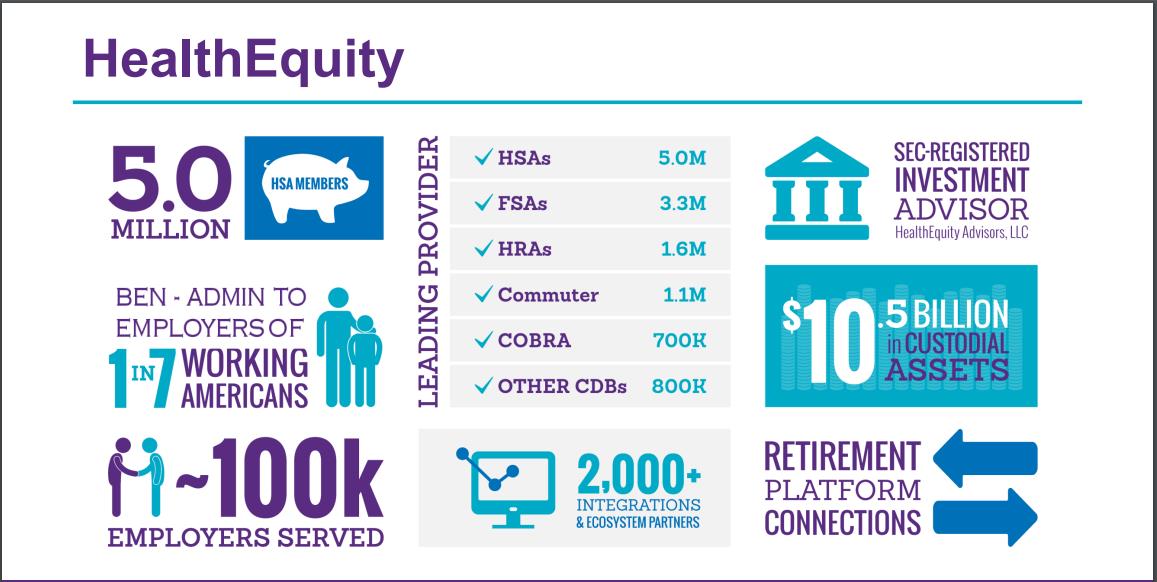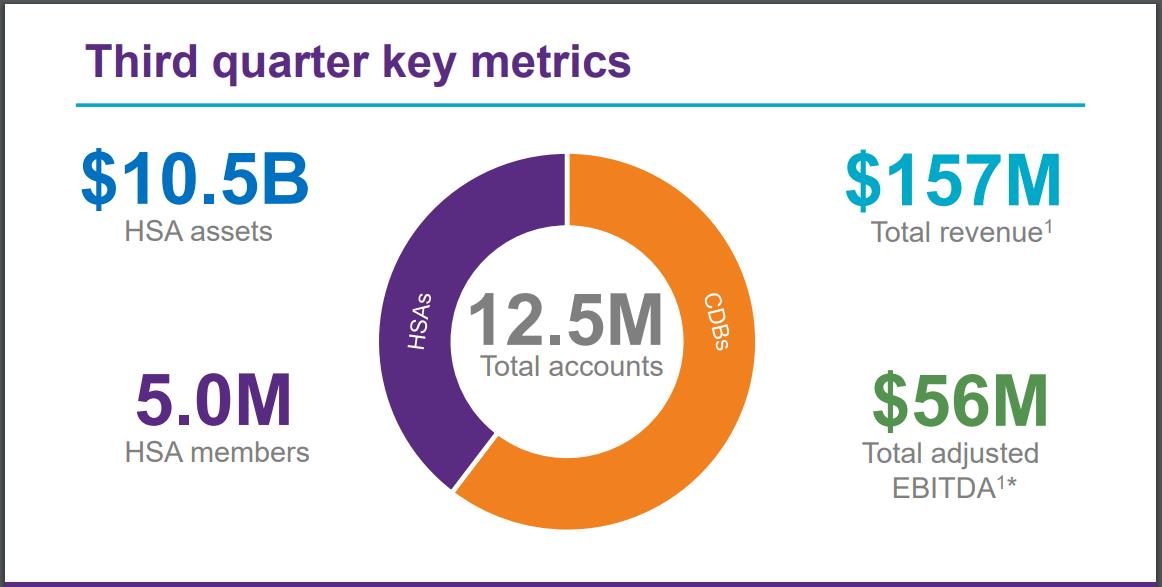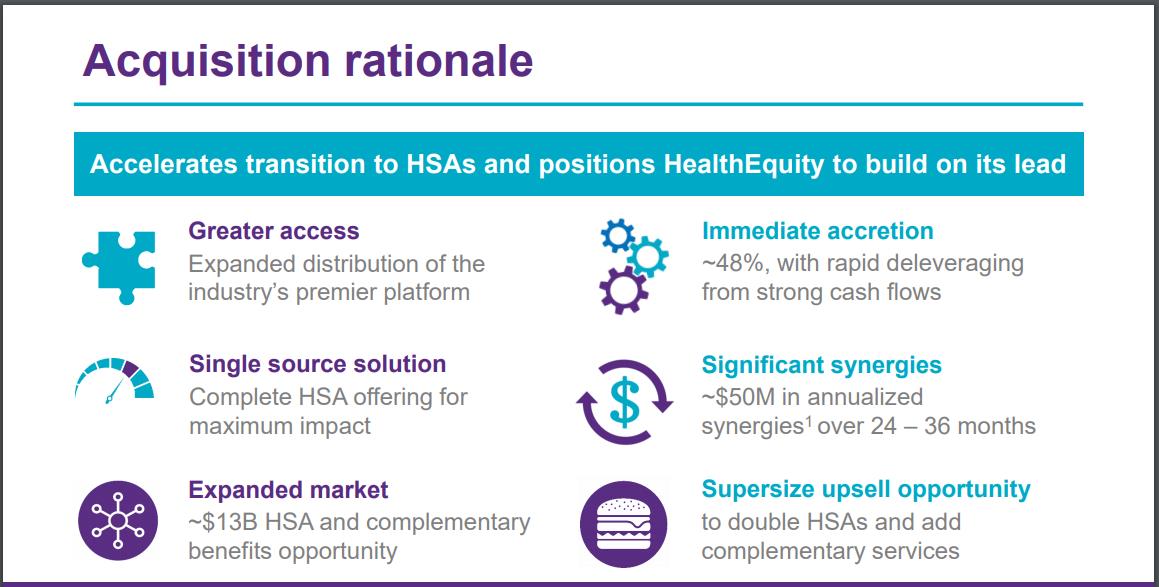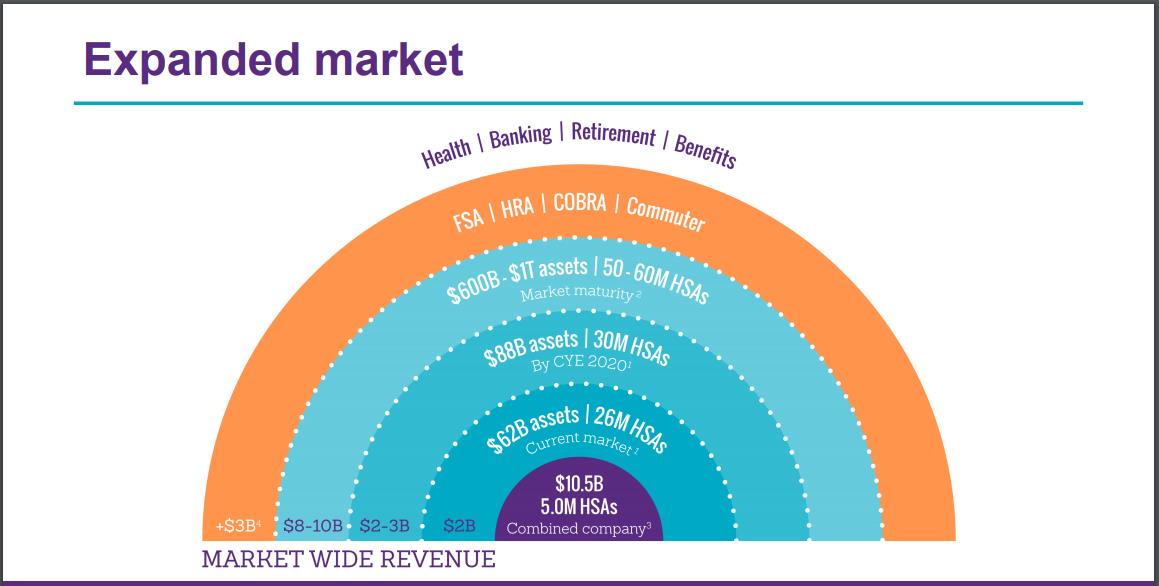HealthEquity’s tie-up with WageWorks is starting to bear fruit. The synergies of this combination were evident in the company’s Q3 2019 quarterly results as the stock rallied over 12% post-earnings. HealthEquity made a bold move to acquire WageWorks for approximately $2 billion in an all-cash deal.
This acquisition has expanded HealthEquity’s moat in the Health Savings Account space while providing new revenue verticals in complementary product offerings. This move is already expanding HealthEquity’s total addressable market as Consumer-Directed Benefits (CDBs) via pre-tax spending accounts such as additional Health Savings Accounts (HSAs), health and dependent care Flexible Spending Accounts (FSAs), health reimbursement accounts (HRA), Commuter Benefit Services, wellness programs, COBRA and other employee benefits are absorbed into its product offerings. This acquisition provides access to a larger client base and access to health brokers that will help drive HealthEquity’s penetration over the long term.
The combination of WageWorks’ leading consumer-directed benefits with HealthEquity’s HSA platform is highly synergistic and will drive growth while expanding the total addressable market in years to come (Figure 1).

Figure 1 – High-level overview of the newly combined HealthEquity/WageWorks company
HealthEquity’s Q3 2019 Earnings and Unique Positioning
HealthEquity announced its Q3 2019 earnings, and the initially popped 16% in after-hours trading. This quarter was the first full quarter with WageWorks being fully integrated into the company’s financial numbers as the acquisition closed on August 30th, 2019.
Revenue for Q3 was $157.1 million, growing 123% compared to $70.5 million for the third quarter ended October 31, 2018, and 21%, excluding the impact of the WageWorks acquisition. Revenue this quarter included: service revenue of $87.6 million, custodial revenue of $47.0 million, and interchange revenue of $22.5 million. HSAs now exceed 5 million, an increase of 37% year over year, or 16% excluding acquired HSAs. Active HSAs were 4.1 million, up 38% from one year ago, including 197,000 HSAs with investments, an increase of 29% year over year. Total Accounts as of October 31, 2019, reached 12.5 million, including 7.5 million CDBs, 6.8 million from the WageWorks acquisition. Total HSA Assets as of October 31, 2019, were $10.5 billion, an increase of 48% year over year, or 24% excluding acquired HSA assets. Total HSA Assets included $7.9 billion of HSA Cash and $2.5 billion of HSA Investment Assets (Figure 2).

Figure 2 – Q3 earnings metrics
HealthEquity’s business model is such that it stands as an intermediary servicing the secular growth Health Savings Account (HSA) space that’s largely independent of legislative actions, drug pricing, rising insurance costs while not playing any role in the pharmaceutical supply chain from health insurers to end-user pharmacies. The company simply manages funds allocated for medical, dental and vision expenses that are deducted on a pre-tax basis and deposited into a dedicated HSA account. The HSA space has grown in popularity as corporate adoption has allowed access to these plans in conjunction with consumer awareness. For long-term investors, HealthEquity presents a compelling picture of growth with a large addressable market moving forward and further strengthened with its new acquisition of WageWorks.
HealthEquity and WageWorks Combination
The acquisition will ostensibly provide HealthEquity with “access to more of the fast-growing HSA market by expanding its direct distribution to employees and benefits advisors as a single source, a premier provider of HSAs and complementary CDBs, including flexible spending accounts, health reimbursement arrangements, COBRA administration and commuter accounts.” Not only is this combination of the two companies complementary, but financial synergies of $50 million in annualized savings will also be realized faster than the anticipated 24 to 36 months of closing via operating efficiencies. The company expects on-going synergies over time as the combined client base takes advantage of the end-to-end offerings.
Jon Kessler will serve as President and CEO of the combined company. Kessler stated, “Acquiring WageWorks positions us to accelerate the market-wide transition to HSAs, with greater market access and an end-to-end proprietary platform built to drive members to spend smarter while saving for healthcare in retirement. Together, we can meet employers and employees wherever they are on their journeys to connect health and wealth, while simultaneously accelerating our growth in an expanding industry. This transaction is compelling for team members and stockholders of both companies, and it accelerates the strategic goals of both companies immediately by adding WageWorks’ market-leading CDB services to HealthEquity’s highly acclaimed HSA platform.”
Edgar Montes, President and CEO of WageWorks noted: “The combination of WageWorks and HealthEquity will be transformative in our industry and will amplify our impact among clients, brokers and policymakers. Together with HealthEquity, WageWorks can bring broader, deeper, more innovative solutions to our customers – giving them greater choice and peace of mind. This transaction recognizes and reflects our strong brand and reputation in the market.” (Figures 3 and 4)

Figure 3 – Highly complementary combination of the two companies

Figure 4 – Expands the total addressable market by layering-in Consumer-Directed Benefits
Consumer HSA Value Proposition
HealthEquity is uniquely positioned as HSAs are becoming an invaluable option for consumers to contain medical costs and take control of healthcare spending. High Deductible Health Plans (HDHP) coupled with HSAs, has contained family plan deductibles at a far lower level than any other healthcare plan.
Additionally, funds deposited in the companion HSA account can be invested into mutual fund options to grow these funds over time. At age 65, these funds can be withdrawn without penalty at your effective rate, effectively serving as a second 401k over time. This dual-purpose account serves as an excellent means to contain healthcare costs while building wealth via investments over the long term.
Summary
HealthEquity has continued its path of accelerating revenue, cash flow, and income growth across all segments of its business in the backdrop of an HSA secular growth market. The WageWorks acquisition is augmenting its core competencies in the Health Savings Account space while providing access to other revenue verticals in the Consumer Directed-Benefits space. HealthEquity is continuing to post strong growth as it expands the number of accounts, manages more custodial assets, expands gross margins and more accounts transitioning into investment vehicles.
HealthEquity Inc. (HQY) is uniquely positioned as HSAs are becoming an invaluable option for consumers to contain medical costs and take control of healthcare spending. Best of all, the company’s business model is such that it stands as an intermediary, servicing the secular growth Health Savings Account space that’s largely independent of legislative actions, drug pricing, rising insurance costs while not playing any role in the pharmaceutical supply chain from health insurers to end-user pharmacies. The WageWorks acquisition has expanded HealthEquity’s moat while providing additional long-term revenue sources for durable growth.
Noah Kiedrowski
INO.com Contributor
Disclosure: The author holds shares in AAL, AMC, GE, KSS, SLB, TRIP, USO and X. However, he may engage in options trading in any of the underlying securities. The author has no business relationship with any companies mentioned in this article. He is not a professional financial advisor or tax professional. This article reflects his own opinions. This article is not intended to be a recommendation to buy or sell any stock or ETF mentioned. Kiedrowski is an individual investor who analyzes investment strategies and disseminates analyses. Kiedrowski encourages all investors to conduct their own research and due diligence prior to investing. Please feel free to comment and provide feedback, the author values all responses. The author is the founder of www.stockoptionsdad.com where options are a bet on where stocks won’t go, not where they will. Where high probability options trading for consistent income and risk mitigation thrives in both bull and bear markets. For more engaging, short duration options based content, visit stockoptionsdad’s YouTube channel.
